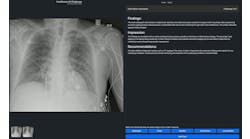Why UT Health San Antonio, UTSA Created First M.D./M.S. Program in AI
Health educators in San Antonio are launching the first program in the nation to combine medicine and artificial intelligence. A Doctor of Medicine (M.D.) from the Joe R. and Teresa Lozano Long School of Medicine at The University of Texas Health Science Center at San Antonio (UT Health San Antonio) and a Master of Science in Artificial Intelligence (M.S.A.I.) from the University of Texas at San Antonio (UTSA) will form a five-year M.D./M.S. program.
Leading the dual-degree program is Ronald Rodriguez, M.D, Ph.D, professor of medical education at UT Health San Antonio. Dhireesha Kudithipudi, Ph.D., a UTSA professor in the department of electrical and computer engineering and founding director of the MATRIX AI Consortium, developed the curriculum for the M.S. in A.I. program. She recently spoke with Healthcare Innovation about the program’s creation and its goals.
Medical students who are accepted to the dual-degree program will be required to take a leave of absence from their medical education to complete two semesters of AI coursework at UTSA. Students will complete a total of 30 credit hours: nine credit hours in core courses including an internship, 15 credit hours in their degree concentration (Data Analytics, Computer Science, or Intelligent & Autonomous Systems) and six credit hours devoted to a capstone project.
Healthcare Innovation: Could you start by describing your role at UTSA? What is the MATRIX AI Consortium you lead?
Kudithipudi: I am the founding director of the MATRIX AI Consortium, a research entity in San Antonio that brings four organizations together. UTSA is the lead organization. But we have UT Health San Antonio, Southwest Research Institute and Texas Biomedical Research Institute as core partners. We have about 87 scientists who are working in different areas relative to AI within this consortium.
HCI: As I understand it, this dual-degree program has been in the works for a few years. What are some opportunities that UT Health and UTSA leaders saw for combining a medical degree with a master's in AI?
Kudithipudi: The dialog around AI has been changing, but the evolution of AI technologies has been in a siloed fashion. The AI scientists or engineers are working at building new technologies without lots of engagement with domain experts. So for example, if you are trying to build AI for healthcare, there is more domain knowledge or deep expertise that the physicians and clinicians can bring to bear in order to build technologies that serve them. If you are working in close collaboration with the domain experts and understanding what challenges they face in the environments they're in, you will build better solutions.
HCI: Have you heard of any other medical schools starting to create similar programs? Or is UTSA really pioneering this?
Kudithipudi: We are the first ones in the country to launch this program. But there are several other institutions that are interested in this and have invited me to speak to their programs. They ask me to give talks to their med school faculty. For example. UPenn and Drexel are thinking of it.
Obviously, it requires quite a bit of effort to think through how to prepare this new-age physician. You're asking a physician to learn about computer programming and how these technologies are deployed in engineering contexts. At the same time, you're asking engineering faculty or computer science faculty to teach clinicians or medical school students. So there's a need for a very creative curriculum that is flexible, that works with these students. But there hasn't been one in the country before we started. We had to really build it from the ground up. We did a lot of surveys with both students at UTSA and at UT Health before we started preparing the program. We also looked at lots of boot camps and other auxiliary training that physicians could get so that we would be more comprehensive in our preparation.
HCI: Are there areas in the UT Health clinical setting where AI is being deployed today and these students could get involved?
Kudithipudi: Yes, there are several ongoing collaborative projects between UTSA and UT Health that students are able to plug into. In the first cohort of students, they were immediately able to plug into these projects. For example, there are projects in classifying neurodegenerative diseases and projects in doing early diagnosis in diabetes or Alzheimer's. There are several projects coming from our radiology department, from the urology department, and from pediatrics. Students can get involved in these projects, not just in the diagnostics aspect of it, but also improving process flows.
HCI: I read that you had a pilot program with two students. Were there some lessons learned working with them that you will apply to larger cohorts?
Kudithipudi: Those two students graduated this summer. One of the things with this program is that we are asking students to take a break for one year from their program and come join us at the UT San Antonio campus and take the courses with other engineering and computer science students. So our concern as we were developing this program was would they have enough background in programming or computing for them to just start right off on some of the foundational courses? So we offered a week-long, intense boot camp where faculty were working very closely with these students to help them prepare for the courses they were going to take in the fall. We also had a mentor from UTSA and a mentor from UT Health working very closely with the students.
Those two students were in a way exceptional, outstanding, because they jumped into the programming right away, and they were very entrepreneurial. But I understand that perhaps not all of the cohort will be that way or may not have as much programming experience. So beyond the boot camps, we will offer them online training sessions periodically on either programming tools or other tools that the students might need. We have project-based courses where they get to team up with the engineers and scientists. But it was a beautiful partnership in a sense that the computer engineers or scientists got lot of benefits from interacting with these MD students, because they were asking: ‘Why would I even use this AI solution in my clinic or in the radiology department? It doesn't make sense. Yes, you’re classifying something, but I would never use something like this, or I cannot see physicians using this because this is going to create additional burden for them.’ So it provides that reality check.
HCI: Is there a larger cohort starting in the program this fall?
Kudithipudi: Even after preparing this program, we never anticipated this to be massive — like 100 students. We anticipate that around 15 students would be a steady state as we go into the next few years. We are getting a similar sample size now, with no more than three or four students. That is what I would expect to see in the first couple of years. Once the word spreads and that builds confidence, I see more numbers coming in. Our graduate dean actually is also open to partnering with other med schools, because there are other universities or programs that are interested in partnering with us — for example, even the dental school within UT Health.
HCI: This has been really interesting to hear about. Anything else about this program that you'd want to stress?
Kudithipudi: I think what we will see is that the graduates of this program will be knowledgeable and can be in tune with an AI technology that is used in medical or healthcare contexts, so that it leads to more equitable healthcare for future generations. That's really the underlying thinking.


